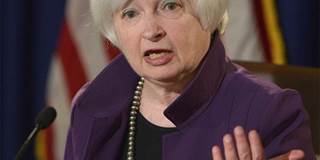As central bankers from around the world gather this week in Jackson Hole for the Federal Reserve’s annual Economic Policy Symposium, one key topic of discussion will be the current global stock-market turmoil. But financial volatility is only one reason why the Fed should not raise interest rates this year.
JACKSON HOLE, WYOMING – As central bankers from around the world gather this week in Jackson Hole for the Federal Reserve’s annual Economic Policy Symposium, one key topic of discussion will be the current global stock-market turmoil. There are many reasons for these gyrations, but the expectation that the Fed will start to raise interest rates – perhaps as early as September – is clearly one of them.
The arguments for a rate hike are valid. The United States’ economy is gaining traction. The International Monetary Fund forecasts 3% annual growth in 2015 and 2016, accompanied by inflation rates of 0.1% and 1.5%, respectively. When an economy is normalizing, it is reasonable to reduce expansionary measures, such as those introduced after the crisis of 2008. Because the Fed has clearly communicated that it will move gradually toward less expansionary policies, its credibility would be damaged if it did not follow through.
But there are strong reasons for the Fed to postpone interest-rate hikes and to keep monetary policy expansionary over the coming quarters. For starters, the US recovery remains weak. Historically, 3% growth during a recovery is far from impressive. In other recent recoveries, growth often hit 4% or even 5% when increased capacity utilization pushed up productivity and investment.

JACKSON HOLE, WYOMING – As central bankers from around the world gather this week in Jackson Hole for the Federal Reserve’s annual Economic Policy Symposium, one key topic of discussion will be the current global stock-market turmoil. There are many reasons for these gyrations, but the expectation that the Fed will start to raise interest rates – perhaps as early as September – is clearly one of them.
The arguments for a rate hike are valid. The United States’ economy is gaining traction. The International Monetary Fund forecasts 3% annual growth in 2015 and 2016, accompanied by inflation rates of 0.1% and 1.5%, respectively. When an economy is normalizing, it is reasonable to reduce expansionary measures, such as those introduced after the crisis of 2008. Because the Fed has clearly communicated that it will move gradually toward less expansionary policies, its credibility would be damaged if it did not follow through.
But there are strong reasons for the Fed to postpone interest-rate hikes and to keep monetary policy expansionary over the coming quarters. For starters, the US recovery remains weak. Historically, 3% growth during a recovery is far from impressive. In other recent recoveries, growth often hit 4% or even 5% when increased capacity utilization pushed up productivity and investment.